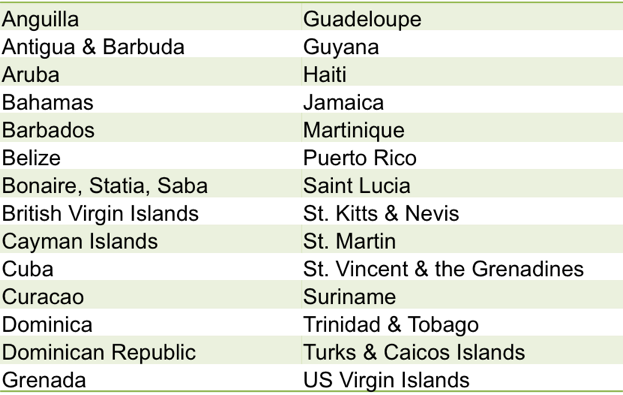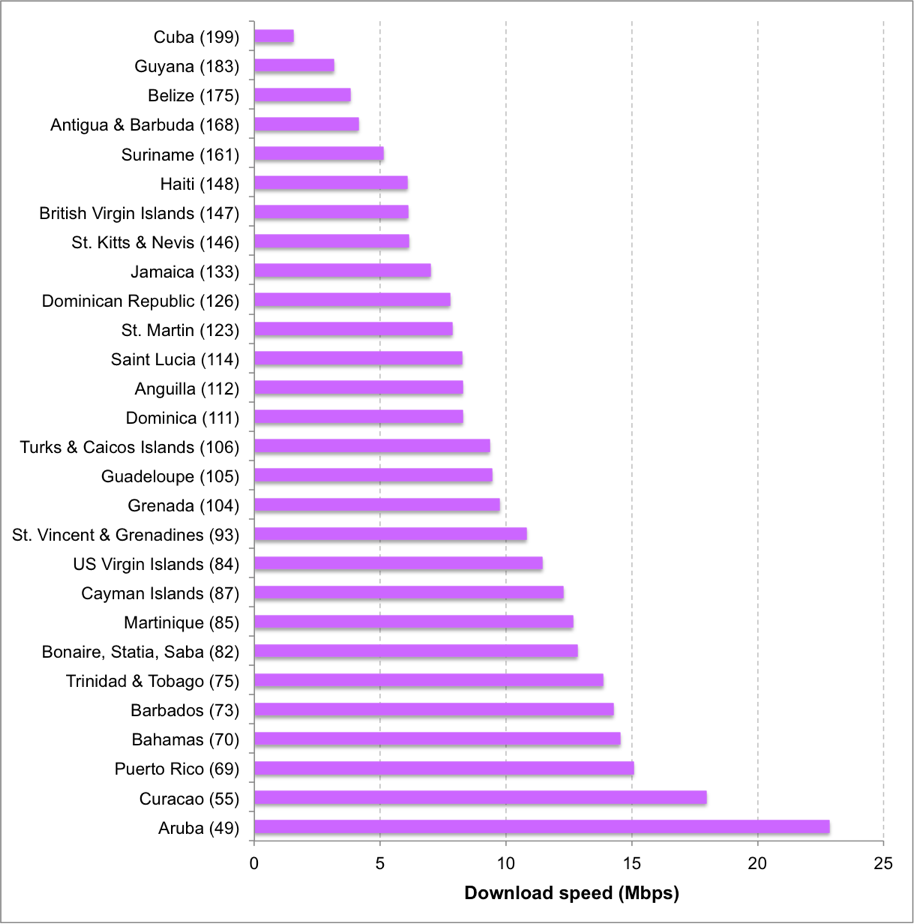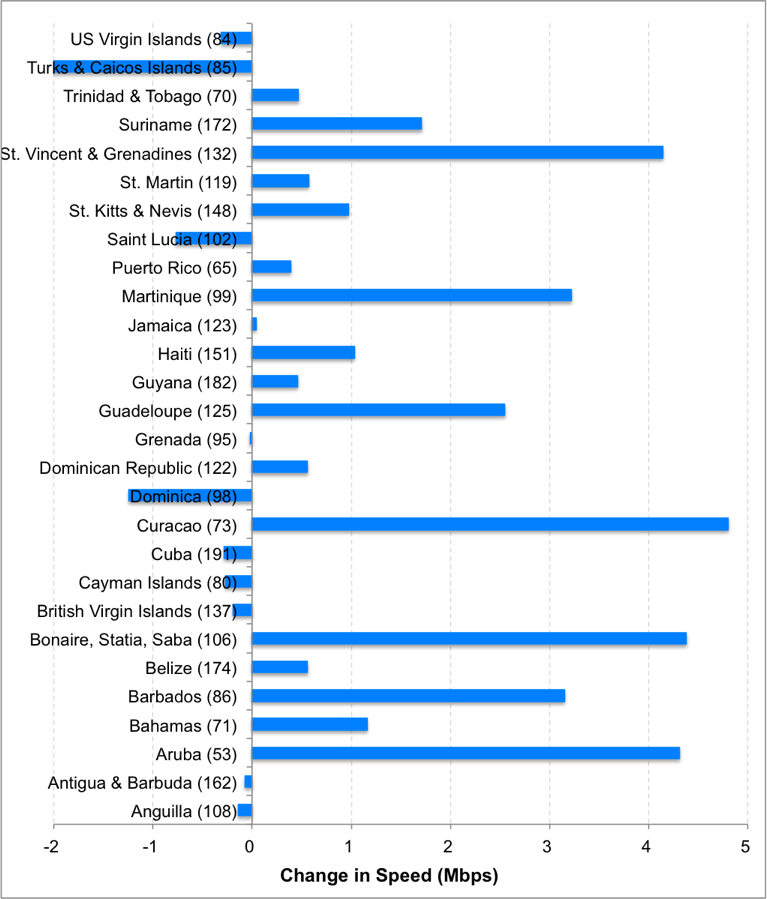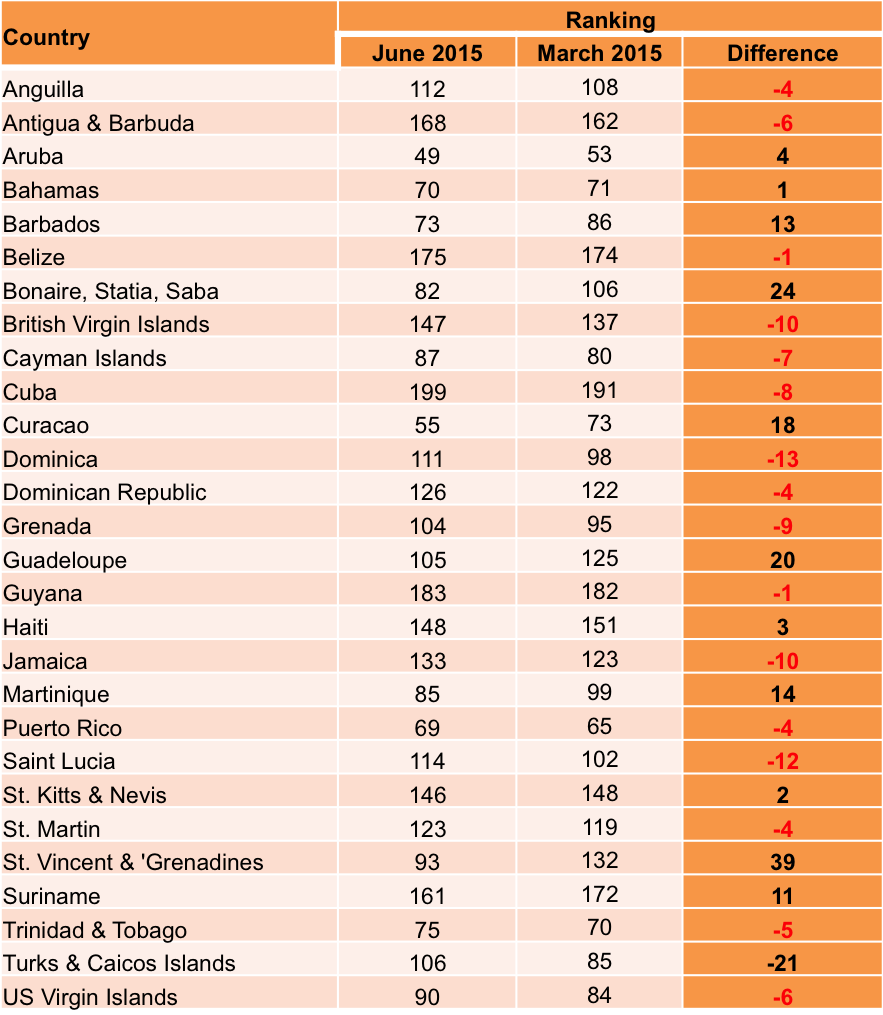An update of actual Internet download speeds in 28 Caribbean countries and a comparison of results recorded in March 2015.
Continuing with one of our most recent additions to our “Snapshot” series, we update our findings on actual (real life) download speeds from across the Caribbean. The last review of this subject was published in March 2015. In addition to presenting results for June 2015, we compare them with those recorded in the last quarter.
Methodology
The methodology that has been used for this assessment has remained the same. Download speed data was recorded from Ookla, a recognised provider of broadband testing and web-based network diagnostic applications, which is able to continuously track Internet speeds and performance globally.
Ookla has formulated two indices – a Household Upload Index and a Household Download Index – which compares and ranks consumer upload and download speeds worldwide, and represents them as a rolling mean speed in Megabits per second (Mbps) over the past 30 days. The results presented in the next section were recorded on 15 June 2015 for the countries listed in Table 1.

Internet download speeds performance as at June 2015
Internet download speeds continue to vary considerably across the 28 Caribbean countries examined, as shown in Figure 1. The fastest download speed was recorded in Aruba, which was ranked 49th out of the 200 countries assessed, at 22.84 Mbps, and was followed by the Curacao, at 17.95 Mbps, which was 55th on the list, and Puerto Rico, at 15.05 Mbps, which was 69th on the list. At the other end of the spectrum, the slowest download speeds were recorded in Cuba, 1.53 Mbps, which was 199th, and thereafter, Guyana, at 3.15 Mbps and was ranked 183rd, and Belize, at 3.79 Mbps, and 175th out of 200 countries.

Globally, the fastest household Internet download speeds were recorded in Singapore (122.51 Mbps); Hong Kong (104.10 Mbps); and Japan (86.86 Mbps), and the global average was 23.80 Mbps. The average download speed across the Caribbean countries examined was 9.65 Mbps, whilst those across other international country groupings, were as follows:
- APEC: 26.80 Mbps
- EU: 31.40 Mbps
- G8: 32.60 Mbps
- OECD: 30.70 Mbps.
What changes have occurred since March 2015?
Since the last quarter there has been a net increase of + 1.04 Mbps in average household download speeds across the region, from 8.61 Mbps in March 2015. Similarly, the global average household download speed is increasing, having risen by +1.50 Mbps from 22.30 Mbps in March, and sacross other groups of countries, the following change in speeds occurred:
- APEC: +1.70 Mbps
- EU: +3.10 Mbps
- G8: +3.20 Mbps
- OECD: +2.60 Mbps.
With regard to the changes in household download speed in individual Caribbean countries between March and June 2015, they varied widely as shown in Figure 2. Eighteen of the 28 countries examined recorded an increase in download speed since the last review. The greatest increases in downloads speeds were recorded in the Dutch Caribbean – Curacao, by +4.80 Mbps, and followed by Bonaire, Statia (Sint Eustatius) and Saba, by +4.38 Mbps, and the Aruba, by +4.31 Mbps.

On the other hand, 10 countries recorded a decrease in their household download speeds. The top three were: the Turks and Caicos Islands , with a drop of -2.01 Mbps; Dominica, where the average download speed decreased by -1.24 Mbps; and Saint Lucia, where a drop of -0.77 Mbps was recorded.
With regard to country ranking in the global index, and as expected, the 10 countries that recorded a decreasing download speeds between March and June 2015, also slipped in the country ranking as reflected in Table 2. However, six additional countries – Belize, the Dominican Republic, Guyana, Jamaica, Puerto Rico, and Trinidad and Tobago – also lost their earlier positions, though they had recorded increased download speeds.

Final thoughts…
In summary, although there was a net increase in average household download speed across the Caribbean between March and June 2015, it cannot yet be said whether this increase is permanent. A broad range of factors ranging from changes in traffic patterns and state of the local and international Internet infrastructure could all have a impact on the download speeds experienced. As a result, longer term tracking of the data would be necessary before such a determination could be made.
Second, it must be emphasised that the average download speed globally is increasing. Further, no Caribbean country recorded a download speed that, at the very least, matched the global average of 23.80 Mbps. Although a download speed greater than 10 Mbps (for example) might seems impressive, it is less than a tenth of the speed being recorded in Singapore, the top ranked country (122.51 Mbps), and thus provides some perspective the disparity between Internet speeds in the Caribbean and the rest of the world.
Bron: ICT Pulse


